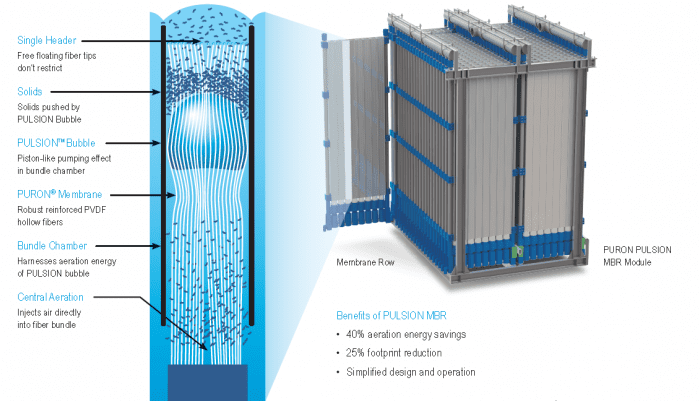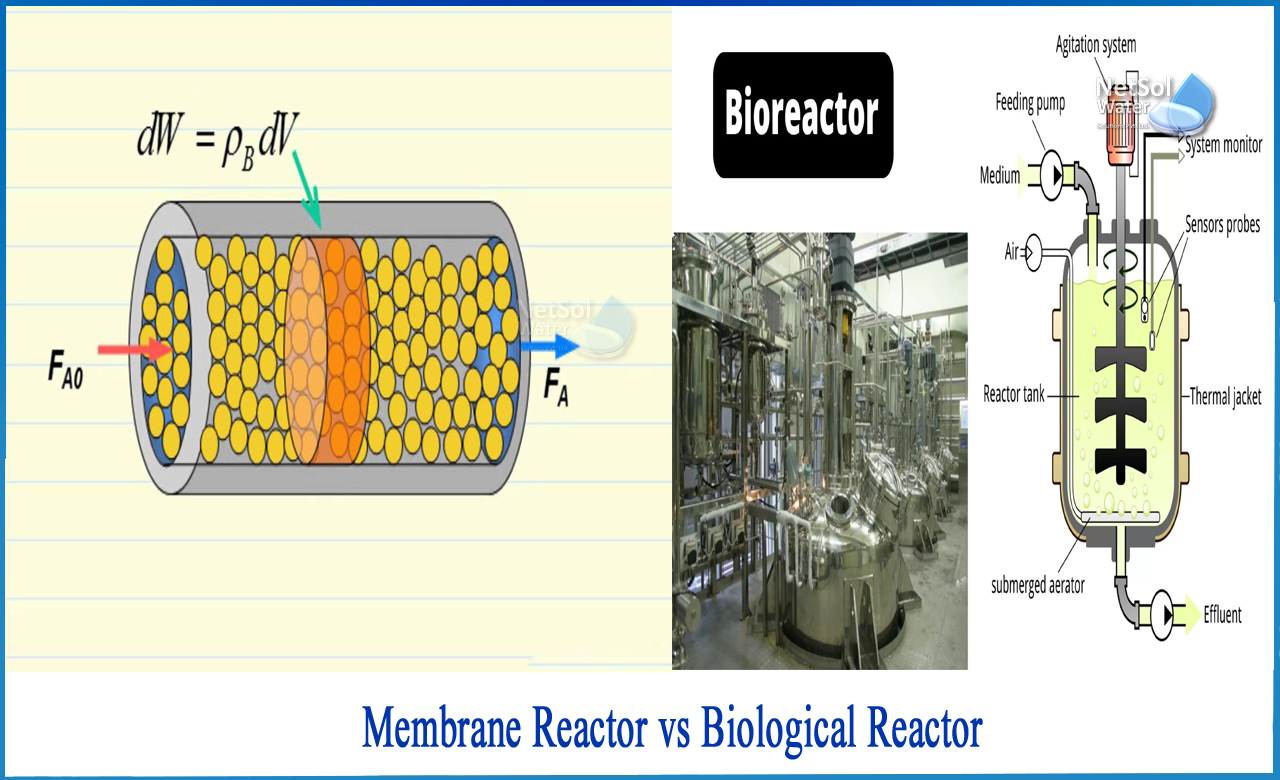How Membrane Bioreactor Can Improve the Quality of Wastewater Treatment
How Membrane Bioreactor Can Improve the Quality of Wastewater Treatment
Blog Article
The Benefits of Membrane Bioreactors in Sustainable Wastewater Management
Membrane bioreactors (MBRs) represent a pivotal improvement in lasting wastewater monitoring, efficiently combining organic therapy with innovative membrane layer filtration technology. As the need for sustainable solutions intensifies, exploring the multifaceted advantages of MBRs may expose unforeseen effects for the future of wastewater treatment systems.
Overview of Membrane Bioreactors
Membrane bioreactors (MBRs) represent a considerable development in wastewater treatment technology, integrating organic deterioration with membrane filtration to enhance the effectiveness of the treatment process. This innovative system integrates the advantages of conventional activated sludge processes with membrane layer innovation, permitting for enhanced solid-liquid splitting up. MBRs make use of semi-permeable membranes to separate treated water from biomass, leading to top quality effluent that can be recycled or safely discharged right into the atmosphere.
The operational design of MBRs commonly entails a bioreactor where microbes break down natural issue, adhered to by a membrane layer system that filterings system the mixed alcohol. This setup not just decreases the footprint of the therapy center yet also permits higher biomass focus and minimized hydraulic retention times. Additionally, MBRs are qualified of treating a broader range of contaminants, consisting of microorganisms and nutrients, making them appropriate for various applications, from metropolitan wastewater treatment to commercial effluent handling.
The assimilation of MBRs right into wastewater administration systems is a sign of a growing fad in the direction of lasting and reliable practices in ecological design. Their ability to generate premium effluent while decreasing area needs placements MBR technology as a principal in contemporary wastewater treatment services.
Improved Effluent Quality

The membrane filtration procedure serves as a physical obstacle, making it possible for the retention of microbes and particulate issue, which adds to a more clear and cleaner effluent (Membrane Bioreactor). In addition, MBRs operate at greater biomass concentrations than standard triggered sludge systems, promoting extra reliable biodegradation of toxins. This causes a reduction in biochemical oxygen need (FIGURE) and overall put on hold solids (TSS) degrees in the last effluent
Furthermore, MBRs show outstanding efficiency in dealing with tough wastewater compositions, such as industrial effluents and wastewater with high nutrient lots. Consequently, the effluent generated is frequently of higher top quality, enabling more adaptable disposal alternatives and decreased environmental impact. Ultimately, the improved effluent high quality accomplished via MBR modern technology highlights its important duty beforehand lasting wastewater administration methods.
Water Reuse Opportunities
The top quality effluent created by membrane layer bioreactors (MBRs) opens up substantial chances for water reuse in numerous applications. MBRs effectively get rid of pollutants, consisting of microorganisms, suspended solids, and raw material, leading to cured water that meets or goes beyond regulatory criteria for reuse. This quality enables the implementation of water recycling campaigns throughout varied markets.
One famous application remains in agriculture, where dealt with wastewater can be used for irrigation, promoting lasting farming techniques while saving fresh water sources. Additionally, MBR-treated effluent can be used for industrial processes such as air conditioning, cleaning, and as a procedure water source, significantly reducing the need for drinkable water in these procedures.
In urban settings, MBRs help with using reclaimed water for landscape watering, commode flushing, and other non-potable usages, contributing to the general durability of water system systems. The integration of MBR innovation in decentralized systems help in managing local water demands, specifically in water-scarce areas.
Reduced Environmental Impact
Exactly how can the fostering of membrane layer bioreactors (MBRs) add to a reduced ecological effect in wastewater monitoring? MBRs dramatically boost the therapy efficiency of wastewater recommended you read while decreasing eco-friendly disruptions. Membrane Bioreactor.
In addition, MBRs operate at reduced hydraulic retention times compared to traditional systems, leading to smaller treatment plant impacts. This compact style decreases land use, thereby maintaining all-natural environments and biodiversity. The process also produces less sludge than standard techniques, mitigating disposal challenges and reducing greenhouse gas emissions connected with sludge monitoring.
Additionally, MBRs assist in the healing of valuable sources, such as water and nutrients, adding to a round economic situation. By allowing water reuse for watering or commercial processes, MBRs aid relieve freshwater deficiency, therefore advertising sustainable water use techniques. Ultimately, the adoption of MBR technology represents a significant stride towards minimizing the ecological impact of wastewater administration systems.
Financial Advantages of MBRs

Additionally, MBRs facilitate the production of high-grade effluent, which can be reused for numerous applications, such as farming irrigation and commercial processes - Membrane Bioreactor. This reuse capability can significantly reduce water procurement costs, giving a monetary motivation for industries facing strict water guidelines
The portable layout of MBR systems additionally leads to reduced land demands, which is specifically valuable in urban areas where realty is expensive. By decreasing area, sectors and communities can save on land procurement and upkeep costs.
Furthermore, MBRs typically need less regular maintenance and have a longer life-span than typical systems, further adding to set you back savings. In summary, the financial benefits of MBRs-- varying from reduced operational Membrane Bioreactor expenses to land financial savings and effluent reuse-- make them a compelling option for lasting wastewater administration, supplying both lasting and immediate financial benefits.
Verdict
Membrane layer bioreactors represent a transformative technique to lasting wastewater administration, integrating biological therapy with innovative membrane layer purification for exceptional effluent top quality. Their capability for efficient contaminant elimination promotes water reuse, thus conserving crucial freshwater resources. Furthermore, MBRs add to lowered environmental effects via small styles and reduced sludge generation. Economic advantages additionally boost their stability, making MBRs an encouraging remedy for dealing with the obstacles of wastewater therapy and advertising sustainable resource monitoring.
Membrane bioreactors (MBRs) stand for a critical improvement in lasting wastewater management, efficiently merging biological therapy with innovative membrane layer purification technology.Membrane layer bioreactors (MBRs) represent a considerable improvement in wastewater therapy technology, integrating organic deterioration with membrane filtering to enhance the performance of the therapy procedure.Accomplishing improved effluent high quality is one of the most significant benefits of making use of membrane bioreactors (MBRs) in wastewater treatment.Additionally, MBRs show excellent performance in dealing with tough wastewater structures, such as commercial effluents and wastewater with high my explanation nutrient lots.Integrating membrane bioreactors (MBRs) into wastewater monitoring not only minimizes environmental impact however likewise presents substantial economic benefits.
Report this page